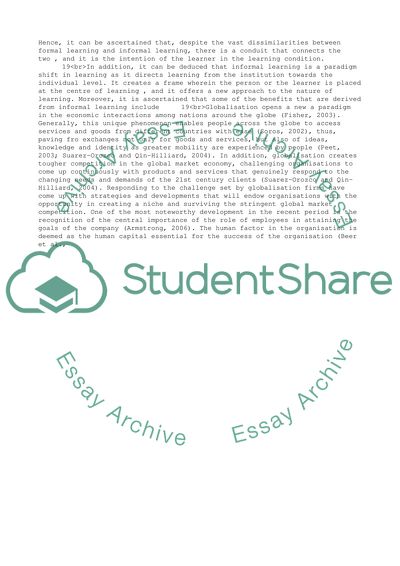
- Home
- Free Samples
- Premium Essays
- Editing Services
- Extra Tools
- Essay Writing Help
- About Us
- Studentshare
- Subjects
- Management
- Formal Learning and Informal Learning
Formal Learning and Informal Learning - Research Paper Example

- Subject: Management
- Type: Research Paper
- Level: Undergraduate
- Pages: 76 (19000 words)
- Downloads: 0
- Author: lynchenrique
Extract of sample "Formal Learning and Informal Learning"
The paper "Formal Learning and Informal Learning" is a perfect example of a management research paper. Globalisation opens a new paradigm in the economic interactions among nations around the globe (Fisher, 2003). Generally, this unique phenomenon enables people across the globe to access services and goods from different countries with ease (Soros, 2002), thus, paving for exchanges not only for goods and services but also for ideas, knowledge and identity as greater mobility are experienced by people (Peet, 2003; Suarez-Orozco and Qin-Hilliard, 2004).
In addition, globalisation creates tougher competition in the global market economy, challenging organisations to come up continuously with products and services that genuinely respond to the changing needs and demands of 21st-century clients (Suarez-Orozco and Qin-Hilliard, 2004). Responding to the challenge set by globalisation firms have come up with strategies and developments that will endow organisations with the opportunity in creating a niche and surviving the stringent global market competition.
One of the most noteworthy development in the recent period is the recognition of the central importance of the role of employees in attaining the goals of the company (Armstrong, 2006). The human factor in the organisation is deemed as the human capital essential for the success of the organisation (Beer et al., 1984; Bontis et al., 1999; Caldwell, 2004; de Meneses and Woods, 2008; Ramirez, Guy, and Beale 2007). In effect, the collective knowledge, skills, learning, abilities and experiences that are deployed by the employees in the performance of their functions is crucial for the success of the firm and a primary source of the organisation’s strategic advantage (Armstrong, 2006).
As such, in the last few decades, much scholarly work has been undertaken to elucidate the various concepts that are inherent in human capital. One of the subject matters that have been given ample consideration is learning in the workplace. Learning is considered as a spectrum of formal learning, informal learning and non-formal learning (Cook and Smith, 2004). A person may move from one section of the spectrum to another without diminishing the significance and influence of learning and its consequences to the individual.
...Download file to see next pages Read MoreCHECK THESE SAMPLES OF Formal Learning and Informal Learning
Development Program for an Organizational Environment
Personal Educational Philosophy
Formal and Informal Learning
The impact of culture on consumer buying behaviour
Formal Systematic Learning Is of Less Importance than Informal Learning
Formal Systematic Learning versus Informal Learning
Personal Educational Philosophy
Developing a Culture for Leadership Development

- TERMS & CONDITIONS
- PRIVACY POLICY
- COOKIES POLICY